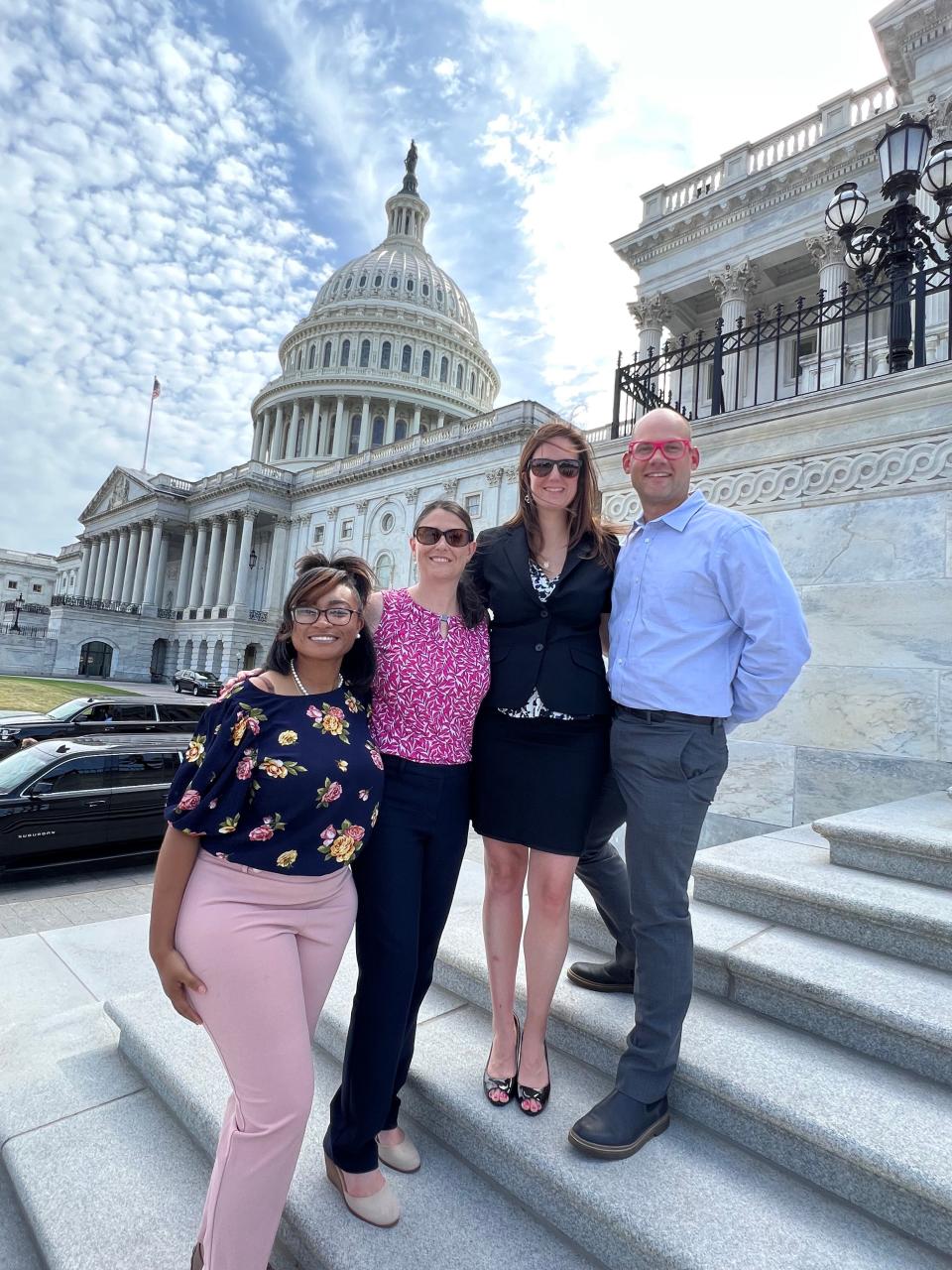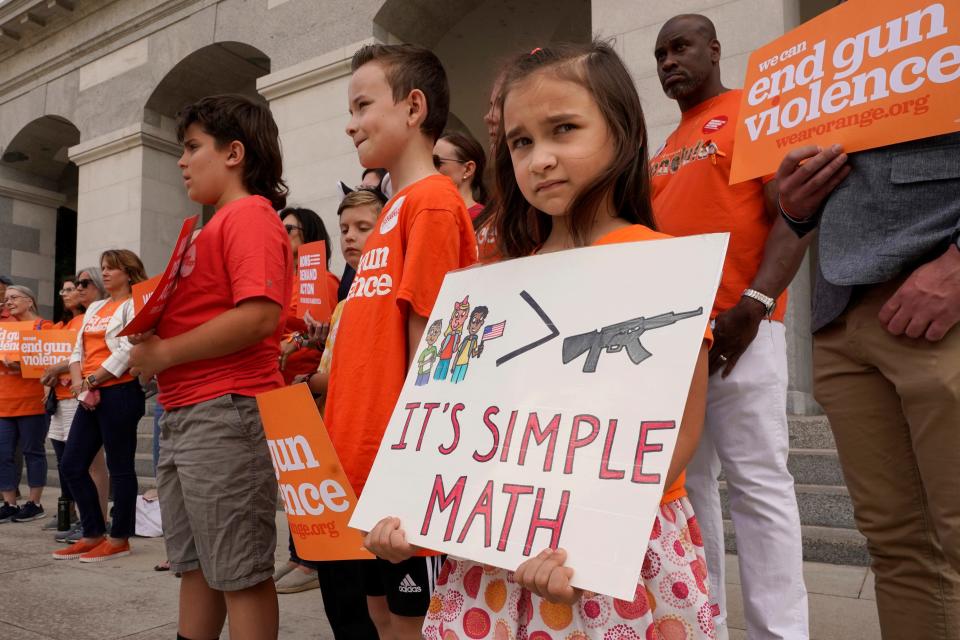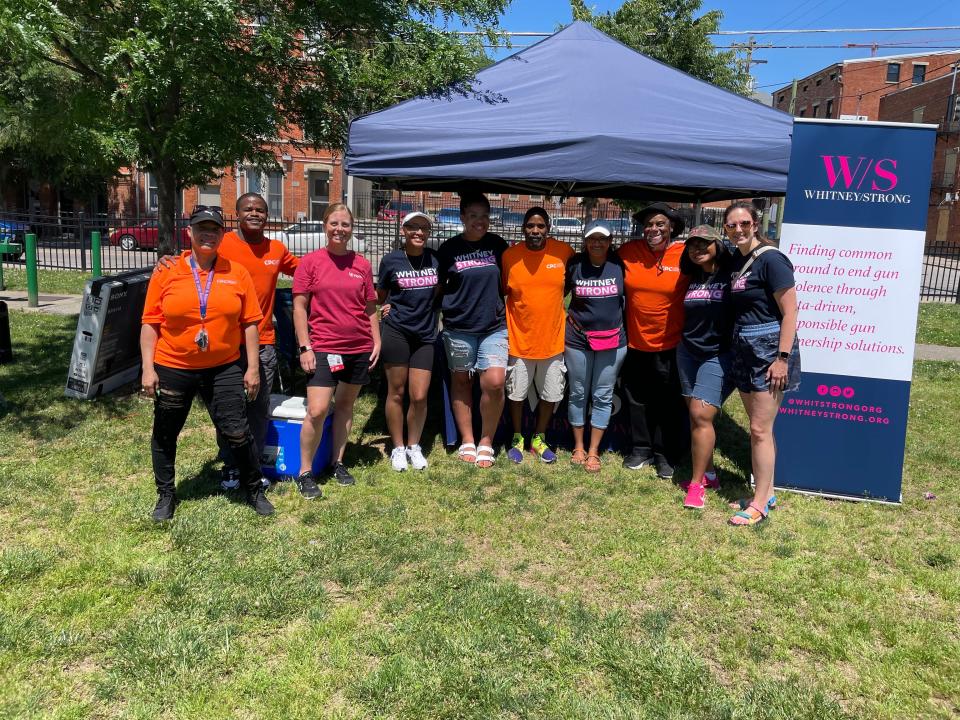Whitney Austin was shot 12 times, but she supports gun laws – and gun ownership
Whitney Austin should not be alive.
In 2018, she walked into the lobby of the Cincinnati bank that employed her and stepped into a nightmare.
A gunman had just opened fire, but Austin was distracted by a work call. Three people were killed, and Austin was struck by 12 bullets. But none hit a vital organ or artery.
“It was a miracle,” Austin, 41, tells USA TODAY. “And I don’t use that term lightly.”
Almost immediately, Austin went from a career in banking to running a nonprofit focused on gun safety – but from a unique point of view.
Despite surviving a shooting, she remains a religious mother of two who owns guns and supports the Second Amendment. But she also thinks responsible firearm ownership means supporting measures that ensure weapons do not end up in the hands of at-risk individuals bent on doing harm to themselves or others.
I was shot 12 times. I own a gun. I know we can find common ground to end gun violence.

“For too long, the extremes have owned the dialogue on guns,” says Austin, whose advocacy and lobbying group Whitney/Strong has offices in Kentucky and Ohio. “It’s either ‘Guns are awful, no one should have them,’ or it’s ‘Guns are amazing, every single person should carry one.’ "
In Washington last week, those extremes compromised. “They worked in the middle, and got it done,” Austin says. “We need more of that.”
Austin's stunning survival led her to Capitol Hill on June 23 as a guest of Senate Minority Leader Mitch McConnell to witness an equally improbable event: the passage of the first meaningful gun control bill in three decades, the Bipartisan Safer Communities Act.
The act calls for tougher background checks for gun buyers under age 21; $15 billion in federal funding for mental health programs and school security upgrades; and blocking gun sales to those convicted of abusing unmarried partners, the so-called “boyfriend loophole.”
'This moment is different': Matthew McConaughey urges leaders to address gun violence

Austin believes history was made because of a confluence of factors. But foremost it was the horror of Uvalde, Texas, where a troubled 18-year-old bought an AR-15 semi-automatic rifle and used it to kill 19 elementary school students and two teachers.
“There’s only so many times politicians can ignore something as horrific as that, where babies are being destroyed by a semi-automatic rifle,” she says.
Americans on both sides of the contentious gun debate were gutted by Uvalde, and that shared sentiment is something a variety of groups working in this space rely on. In that sense, Austin is not alone as a gun owner pushing for change.
“As an Army veteran, I stand on the premise that gun safety and firearm training saves lives," says Army veteran Melody McFadden, whose mother was shot to death in a domestic violence situation and feels a kinship to Austin in that both believe they can use their personal trauma to make their communities safer.
"The vast majority of gun owners, myself included, support common-sense measures like the ones passed by Congress because we’re all safer when guns are kept out of the hands of those who shouldn’t have them," says McFadden, a Moms Demand Action volunteer and a Veterans Advisory Council member with Everytown for Gun Safety, the nation's largest gun violence prevention organization.

Austin believes having laws that allow for guns to be taken from at-risk individuals might have averted her own shooting.
“There were warning signs,” she says of the gunman, who was killed by law enforcement. “I believe an extreme risk protection order of some kind could have prevented it.”
Whitney Austin played dead in that lobby, then reclaimed her life as a mom and activist
Austin grew up in Louisville, Kentucky, just outside downtown, in a nice neighborhood. Her father always kept a rifle in the house.
"He wasn't a hunter," she says. Family conversations included talking about responsible gun ownership and how to react in case of an emergency. "The point was to be educated around guns."

When Austin married at age 25, her husband Waller, an artist who is the son of a surgeon, brought his guns into their household.
"It's not accurate to paint me as someone who is interested in firearms," she says. "But here and there over the years, out on a farm, I'd shoot some rounds out of curiosity."
When the couple welcomed two children, they set about securing the guns, many of historic value, in a safe place separate from ammunition.
And then she was shot. One harrowing photo shows Austin from an aerial vantage point. She is sprawled out in the bank lobby, legs and arms akimbo like a rag doll. Blood pools around her.
"That photo to this day takes my dad out," Austin says softly.
Austin recalls that moment vividly. She was playing dead, but aware that she was still very much alive.

It is from that state that she emerged as a powerful voice in the fight to make sure others don't suffer her fate. Part of the hard work of her recovery involved three surgical interventions to restore motion to her arms. Difficult physical therapy sessions also helped.
Today, she has most of her range of motion and sense of touch. She still has trouble waving with her right hand and doesn't like it when someone touches her left arm in a certain way because of her nerve damage.
Shrapnel in her chest can get sore. Before all the metal was removed from her right arm, she could feel the "cold weather in my bones." And any form of gunfire still makes her jump.
Psychologically, counseling was critical. And although her faith and simple gratitude at being alive and back with her family continues to fuel her, Austin says she still has rough days. Usually after news breaks of a mass shooting.
“I don’t do healthy behaviors in those instances, I read every article, consume every detail about the victims, and I feel completely helpless and out of control,” she says. "I think, 'OK, can we move to an island?' But then I will myself back into the work of Whitney/Strong. When I activate others to work toward progress, I get back to a healthy place."
Whitney/Strong works both in local neighborhoods and on Capitol Hill
Austin welcomes anyone to her fold. Some write checks; others write letters to senators.
Some volunteer their time to staff Save a Life gun safety sessions set up in neighborhoods in Cincinnati and Louisville that have high rates of gun violence. Others, including her husband, are helping make gun safety videos to share with schools and community groups.

Whitney/Strong also sponsors research that can help identify ways to reduce gun violence, such as a hospital that found gun locks help prevent adolescent suicide.
On the legislative level, the organization is working to get the overwhelmingly Republican political leaders in Ohio and Kentucky to embrace elements of gun control.
Austin is well aware that enlisting gun owners and politicians to push for gun safety laws and practices is inextricably linked with her geography. "If we were in New York or California doing this, we'd have a harder time with our strategy," she says.
Last week's bill passage was an undeniable highlight for Austin, something that keeps her committed to the long journey ahead.
“There’s more legislation to be passed, more sensible policies to be adopted, more common ground to be found,” she says. “But waking up alive in the hospital and being in the gallery last week are two moments I will never forget. I’m lucky to be in this position, there are so many survivors of gun violence that don’t get what I get.”
She pauses.
“I will never lose the gratitude I have," she says. "And I will never give up the fight to make us all safer.”
This article originally appeared on USA TODAY: She's pro-gun and pushing for reforms after being shot 12 times

